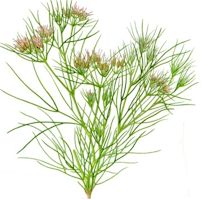 |
Cumin (Cuminum cyminum) is not half sufficiently known, or esteemed as a domestic condiment of medicinal value, and culinary uses; whilst withal of ready access as one of our commonest importations from Malta and Sicily for flavoring purposes, and veterinary preparations. It is an umbelliferous plant, and large quantities of its seeds are brought every year to England. The herb has been cultivated in the East from early days, being called "Cuminum" by the Greeks in
classic times. The seeds possess a strong aromatic odor with a penetrating and bitter taste; when distilled they yield a pungent powerful essential oil. The older herbalists esteemed them superior in comforting carminative qualities to those of the fennel or caraway. They |
are eminently useful to correct the flatulence of languid digestion, serving also to relieve dyspeptic headache, to allay colic of the bowels, and to promote the monthly flow of women.
In Holland and Switzerland they are employed for flavoring cheese; whilst in Germany they are added to bread as a condiment.
Here the seeds are introduced in the making of curry powder, and are compounded to form a stimulating liniment; likewise a warming plaster for quickening the sluggish congestions of indolent parts. The odorous volatile oil of the fruit contains the hydro-carbons "Cymol," and "Cuminol," which are redolent of lemon and caraway odors. A dose of the seeds is from fifteen to thirty grains. Cumin symbolized cupidity among the Greeks: wherefore Marcus Antoninus was so nick-named
because of his avarice; and misers were jocularly said to have eaten Cumin.
The herb was thought to specially confer the gift of retention, preventing the theft of any object which contained it, and holding the thief in custody within the invaded house; also keeping fowls and pigeons from straying, and lovers from proving fickle. If a swain was going off as a soldier, or to work a long way from his home, his sweetheart would give him a loaf seasoned with Cumin, or a cup of wine in which some of the herb had been mixed.
The ancients were acquainted with the power of Cumin to cause the human countenance to become pallid; and as a medicine the herb is well calculated to cure such pallor of the face when occurring as an illness. Partridges and pigeons are extremely fond of the seeds: respecting the scriptural use of which in the payment of taxes we are reminded (Luke xi. v. 42)--"ye pay tithe of mint, and anise, and cummin." It has been discovered by Grisar that Cumin oil exercises a special
action which gives it importance as a medicine. This is to signally depress nervous reflex excitability when administered in full doses, as of from two to eight drops of the oil on sugar. And when the aim is to stimulate such reflex sensibility as impaired by disease, small diluted doses of the oil serve admirably to promote this purpose.
Herb Simples
The Primitive Simplers presented here show the way of life in other generations, it is not suggested or recommended trying them yourself. |
|
Garden
Herbs
Home
History of Herbs
Herb Gardening
Herbs for Beginners
Drying & Preserving Herbs
Indoor Herb Gardening
Herb Garden
Hints & Tips
Herbal
Cooking
Herb Chart
Using Herbs
Culinary Herbs
Herb
Oil and Vinegar
Herb Teas
Herb Candy
Herb Jelly
Herb Simples
Preface
Introduction
Alphabetical Listing

Trade
Recipes Online
Share your Recipes with others!!
|


